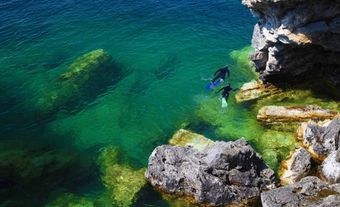Sverdrup Islands, located in the High Arctic, comprise a large island, Axel Heiberg, and two smaller ones, Ellef Ringnes and Amund Ringnes. Their geological history began as an area of subsidence and sedimentation on a landmass margin. Deformation occurred, followed by a second episode of uplift. In the early Tertiary, after a long period of sedimentation, the basin sediments were folded and faulted and the present land surface was uplifted and mountains formed. Today, glaciers occupy a large proportion of the mountainous area - some reaching the sea. A narrow coastal strip of thin sediments was laid down in the early Pleistocene along the arctic shore. The discovery of these islands by the Second Norwegian Polar Expedition (1898-1902), under the command of Otto Sverdrup, led to a sovereignty dispute, settled in Canada's favour only in 1931.
-
- MLA 8TH EDITION
- Finlayson, Douglas. "Sverdrup Islands". The Canadian Encyclopedia, 23 January 2014, Historica Canada. www.thecanadianencyclopedia.ca/en/article/sverdrup-islands. Accessed 22 December 2024.
- Copy
-
- APA 6TH EDITION
- Finlayson, D. (2014). Sverdrup Islands. In The Canadian Encyclopedia. Retrieved from https://www.thecanadianencyclopedia.ca/en/article/sverdrup-islands
- Copy
-
- CHICAGO 17TH EDITION
- Finlayson, Douglas. "Sverdrup Islands." The Canadian Encyclopedia. Historica Canada. Article published February 07, 2006; Last Edited January 23, 2014.
- Copy
-
- TURABIAN 8TH EDITION
- The Canadian Encyclopedia, s.v. "Sverdrup Islands," by Douglas Finlayson, Accessed December 22, 2024, https://www.thecanadianencyclopedia.ca/en/article/sverdrup-islands
- Copy
Thank you for your submission
Our team will be reviewing your submission
and get back to you with any further questions.
Thanks for contributing to The Canadian Encyclopedia.
CloseArticle
Sverdrup Islands
Article by Douglas Finlayson
Published Online February 7, 2006
Last Edited January 23, 2014

 Share on Facebook
Share on Facebook Share on X
Share on X Share by Email
Share by Email Share on Google Classroom
Share on Google Classroom

